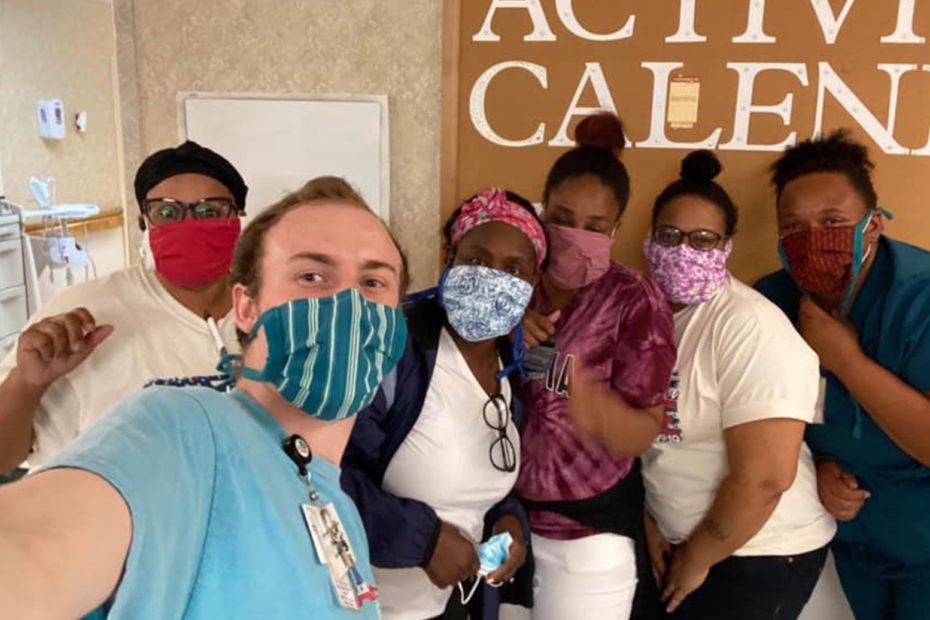At the beginning of the year, internal medicine physician and former Congressional candidate Kyle Horton didn’t know that she’d be learning a new skill. While initial attempts at sewing broke her mother’s old sewing machine, in the last two months Horton and her colleague Mimi Marquis moved the needle to provide personal protective equipment (PPE) to their community in Eastern North Carolina.
Openly sourcing medical supplies empower individual residents to make a huge impact on their communities’ public health, even as they remain under shelter-in-place. Indeed, the work of the Open Source Medical Supplies (OSMS) community in Cape Fear, North Carolina provides a roadmap for just that — ordinary people coming together and pooling resources to make a difference.
As the global pandemic reached the United States, Horton discovered the OSMS Facebook page and its suggestions for sewing masks using readily available fabric and sewing machines. With her background in medicine and community organizing, Horton and Marquis stitched together a team of about fifty local residents to produce PPE.
While still working full-time at a travel marketing company, Marquis created online forms for community organizations to request masks, and for fabric cutters, mask sewers, and PPE delivering drivers to connect and create a local supply chain.
Sheltered in place and with more time on their hands, the sewers of Cape Fear answered the call to action. With many of the sewers working on their machines full time, the effort certainly keeps Joanne’s and Michael’s in business, as Horton and Marquis report that gung ho sewers buy fabric and cotton in bulk, out of their own pockets, to keep themselves busy.
On a deeper level, the OSMS effort provides emotional and spiritual support to those feeling hopeless against the tragedy of the pandemic. Horton explained that sewers often say to her “I just keep sewing because it stops me from thinking about everything else going wrong in the world.” Another woman in the community suffered the loss of her mother to COVID-19. She told Horton that making masks helped her cope with her loss and deal with her grief.
For the sewers, cutters and drivers, the effort also sheds light on the underrepresented communities of Eastern North Carolina. Each week, Horton and Marquis communicate with the sewers as to who they’re “sewing for.” The OSMS effort received PPE requests from diverse community groups such as the Latino Alliance, Manos Unidas, and groups that work with at-risk youth from underprivileged backgrounds. Residents from these organizations are already more susceptible to the ravaging effects of the pandemic, and so the effort in Cape Fear takes a special interest in making sure that they’re well protected. In addition to local efforts, the sewers began sending PPE to the indigenous communities of the Navajo Nation in Arizona, a place that COVID-19 hit especially hard. As the effort stretches into its third month, a commitment to serving others keeps sewers motivated. “It helps when they see the effect that they’re having,” Marquis said.
In the long term, Horton believes that the effort learned valuable lessons about the community response to health crises and disasters. The OSMS effort formed a strong relationship with the county disaster relief task force, which could pay dividends as coastal North Carolina approaches hurricane season. Hurricane Florence, which slammed the Carolinas in 2018, still lingers in the minds of Horton and Marquis. They believe that the experience they’ve gained distributing lifesaving equipment in a pandemic will translate well for potential future storms.
All in all, the effort and hustle demonstrated by Horton, Marquis and the team in Cape Fear serves as a powerful testament to the ingenuity and selflessness of community. The team saw a gap in the response to the pandemic, and swiftly filled it. “People are really stepping up to do their part,” Horton said.
